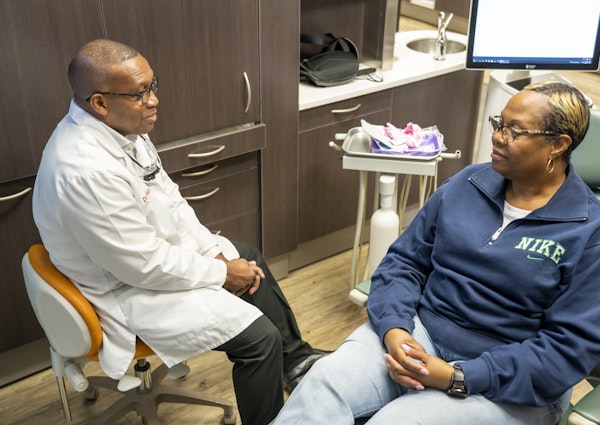
Sleep Apnea
Sleep Apnea Explained
Unlike simple snoring, sleep apnea is defined by a lapse in breathing that can last 10 to 20 seconds or more. A patient who suffers from this condition may experience these episodes dozens of times each night.
Patients may wake up coughing and gasping for air as the body tries to reinitiate breathing. Sometimes, this interruption is so fast you might not even remember waking up.
I Do Feel Tired All Day Does Sleep Apnea Affect Other People, Too?
Absolutely. Sleep disorders like obstructive sleep apnea affect more people than you would think.
*According to Sleepapnea.org
Alarmingly, 80 percent of these Americans suffer from the debilitating symptoms of obstructive sleep apnea without being diagnosed.
Request a consultation with Dr. Saccoh at his state-of-the-art Joppa, MD, practice if you find yourself having trouble concentrating or staying awake during the day. He will use the latest advances in dentistry to determine if sleep apnea treatment can help you get a better night's rest.
There Are Three Types of Sleep Apnea
Obstructive Sleep Apnea
This type of sleep apnea literally obstructs your breathing when the soft tissues in the back of the throat relax and block the upper airway. Your bed partner's sleep may be disrupted, as well, due to your obstructive sleep apnea.
Central Sleep Apnea
With central sleep apnea, your airway is not blocked. However, central sleep apnea stops your brain from sending signals to the muscles that control your breathing.
Complex Sleep Apnea
This serious disorder is a combination of OSA and central sleep apnea. If the possibility exists that you have central or complex sleep apnea, you will be referred to a trusted sleep specialist for treatment.
Exhausted All Day? Contact Dr. Saccoh for a Sleep Apnea Consultation
A restful, deep sleep is not only healthy for you, but can also improve the health of your bed partner. Sleep apnea can make getting a good night's sleep impossible.
Dr. Mohamed Saccoh has the experience and training to develop a nonsurgical, customized treatment plan involving an oral appliance that will allow air to flow freely through your upper airway, decreasing loud snoring and your need to gasp for air while sleeping.
Want to feel more refreshed during the day and avoid the serious risk factors associated with obstructive sleep apnea? Contact our Joppa, MD, practice using our simple online form or by giving us a call. We also offer CareCredit® financing, should out-of-pocket costs be a concern.
So don't sleep on it. Start the journey to a better night's rest today.

5-Star Love for Our Joppa, MD, Practice
"I usually avoid the dentist, but this place—all of them—from the beginning of the appointment to the end, I feel comfortable (that’s a first in 10 years!)." Porsche Smith - 2021
Our Simple Obstructive Sleep Apnea Treatment
Dr. Saccoh offers obstructive sleep apnea treatment with an easy-to-wear oral appliance. This custom-made device, also called a night guard, fits comfortably between the teeth and holds the lower jaw slightly forward. This jaw position prevents the soft palate from obstructing the upper airway during sleep, so the patient can breathe more freely and comfortably throughout the night. Oral appliances can help patients with mild to medium obstructive sleep apnea symptoms.
Oral Appliance vs. CPAP Machine
:quality(70)/https://einstein-assets.imgix.net/assets/5501/259349/original.jpg?auto=format&fit=max&w=600)

The standard treatment for obstructive sleep apnea is a CPAP (continuous positive airway pressure) machine. This mechanical device consists of an electric fan unit that forces air through a tube and into a patient’s upper airway through a face mask. The continuous positive airway pressure keeps the soft tissues from blocking the airway and interrupting normal breathing patterns.
Dr. Saccoh's Joppa, MD, patients prefer a customized oral appliance for reasons like these:
- The CPAP mask, hose, and fan unit are hard to travel with. Your oral appliance fits in a small plastic case.
- The CPAP fan is loud and can keep you and your bed partner awake. Oral appliances make no noise.
- With a CPAP machine, you have to sleep on your back. You can sleep any way you want with an oral appliance.
- Some CPAP masks don't fit properly, decreasing effectiveness. Your oral appliance will fit snugly on your teeth.
Daytime Sleepiness: A Dangerous Obstructive Sleep Disorder Symptom
/
Interrupted sleep at night can have life-threatening consequences by day, especially if daytime sleepiness hits while driving. Falling asleep at the wheel could endanger the lives of you, your family, and other people sharing the Maryland roads.
More Symptoms of Obstructive Sleep Apnea
- Headaches
- Loud Snoring
- Weight Gain
- Depression
- Trouble Concentrating
- Forgetfulness
- Stroke
- Heart Attack/Arrhythmia
- Heart Failure
- High Blood Pressure (Hypertension)
- Diabetes/Diabetes Complications
- Falling Asleep at Times of Low Activity
"Sleep deprivation can lead to serious health issues such as high blood pressure and heart failure. Dr. Mohamed Saccoh can offer a solution."
Receiving Your Oral Appliance
Dr. Saccoh has the experience and training to develop a nonsurgical, customized treatment plan involving an oral appliance that will allow air to flow freely through your upper airway.
Who Can Develop Obstructive Sleep Apnea?
Patients who are overweight or have a large neck are more prone to developing OSA. Men are also more likely than women to have OSA, and the risk increases with age. Other risk factors include a genetic predisposition, large tonsils, a narrow airway, or a nasal obstruction from allergies, sinus problems, or a deviated septum. If left untreated, sleep apnea can lead to many serious side effects, such as morning headaches, daytime fatigue, heart attack, and death.
Making the Most of Your Treatment by Prioritizing Your Health
Lose Weight
Being overweight can contribute to sleep apnea because fat tissue can block your upper airways. For more well-rounded treatment, try to lose excess weight by adopting a regular exercise routine and eating a healthy diet.
Exercise Regularly
Exercise won't just help you lose weight; it can also help people who have sleep apnea by boosting oxygen levels, improving sleep quality, and reducing symptoms. We recommend exercising for at least 30 minutes a day, five times a week.
Curb Certain Habits
Quitting smoking and reducing alcohol intake can improve your sleep quality and overall health.
Change Sleeping Position
People who sleep on their backs may experience sleep apnea symptoms like excessive snoring and interrupted breathing more than those who sleep on their sides. Side sleepers can often keep their airways open better.
Benefit From a Comprehensive Approach to Your Care Contact Our Joppa Office Today
If you've been making lifestyle changes, but you're still experiencing the effects of sleep apnea, it may be time to pair your new life habits with an oral appliance. This comprehensive approach may yield better results than just using one solution or the other. Dr. Saccoh can provide you with an oral appliance and advice to get the most out of your treatment.
If you have sleep apnea, see what we can do to alleviate your symptoms and help you achieve peaceful rest. Reach out to us by filling out our contact form or calling:
(410) 679-4500

More High Praise for Dr. Saccoh's Care
"Very friendly and professional staff. Great customer service. Family oriented. Bring your entire family to this Dentist. They will take good care of you." Maxwell Alukwu - 2021


